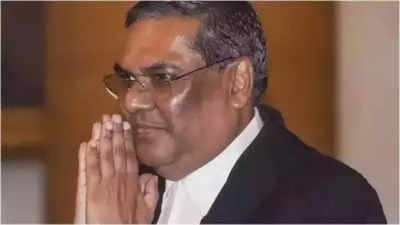- News
- India News
- Court attitude changed after Emergency: CJI Sanjiv Khanna
Trending
Court attitude changed after Emergency: CJI Sanjiv Khanna
CJI Sanjiv Khanna reflects on the shift in judicial perspectives post-1975 Emergency, acknowledging the evolution from isolated interpretation of fundamental rights to integrated readings. He emphasizes the SC's role in fostering social justice, equity, and upholding constitutional values, while noting challenges like delays, litigation costs, and the impact of falsehood in justice delivery.
NEW DELHI: CJI Sanjiv Khanna on Tuesday said judicial attitude underwent a significant change after the imposition of Emergency in 1975, a black spot in Indian democracy that saw the Indira Gandhi-headed Congress govt vengefully supersede his uncle, Justice H R Khanna, with Justice M H Beg to the post of CJI in 1977.
Speaking from the ceremonial full court commemorating the 75th year of the first sitting of SC in 1950, CJI Khanna said while the 1950s decade was the sunrise years for SC, the next decade when the court's judge strength was increased from eight to 14 were the years of anchorage and discovery.
Budget 2025 Updates
He called the 1970s and 1980s as "years of turbulence leading the way to social justice and equity jurisprudence". In 1973, an SC bench in Kesavananda Bharti judgment had by a narrow margin devised the 'basic structure theory' to demarcate the unamendable part of the Constitution, a ruling that went against the intents of Indira Gandhi and in which Justice H R Khanna had tilted the balance for the majority view.
It was followed by the ADM Jabalpur case ruling, in which Justice Khanna Sr had penned the lone dissent to rule Emergency powers could not extinguish the right to life, which he said was inherent to a nation's existence. The CJI said, "In the initial years, SC had interpreted all fundamental rights as rights working in exclusive silos. This judicial attitude, however, underwent a significant change after the Emergency was imposed in 1975." He said the court in 1978 in the Maneka Gandhi case had ruled Articles 14, 19 and 21 were not mutually exclusive and had to be read together.
He said Constitution created a strong centre but advocated a balanced federal structure, a characteristic of governance which a nine-judge bench in S R Bommai case had termed as a basic feature of the Constitution. "Bommai (judgment) also has implications for the secular fabric of India. SC had also ruled that secularism is a basic feature of the Constitution."
Supreme Court Bar Association president Kapil Sibal said SC must champion the Constitution, especially when confronted with challenges to constitutional values that are creating serious problems. The CJI said the 1990s in the SC marked an era of consolidation and expansion of fundamental rights. "The last two decades of the 21st century stand as a testament to the SC's evolving role in our constitutional framework." On the challenges ahead, the CJI said, " First, the weight of arrears which continues to delay justice. Second, mounting costs of litigation threatens true accessibility. Third, and perhaps most fundamentally, justice cannot thrive where and when falsehood is practised."
Get real-time updates on Budget 2025 and Income Tax Slabs on Times of India. Check out the latest income tax slabs FY 2025-26.
End of Article
FOLLOW US ON SOCIAL MEDIA





















